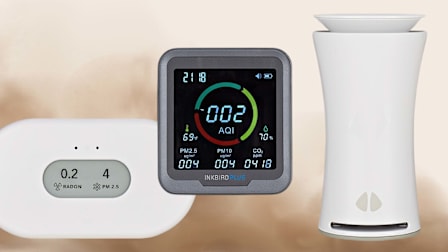Keep Your Lungs Healthy and Strong
These tips can help you breathe easier now and for many years to come
When you shop through retailer links on our site, we may earn affiliate commissions. 100% of the fees we collect are used to support our nonprofit mission. Learn more.

Your body’s cells need oxygen to live. That’s why taking care of your lungs, which help transport that oxygen, is critical.
As you age, changes to your bones, muscles, and lung tissue can compromise your lung function, causing shortness of breath and increasing your risk of infection. Exposure to air pollutants can also compromise your lungs, as can heart failure, which can lead to fluid buildup. Some decline in lung function is expected as you age, but along with exercise (which is key), other steps can help you breathe easier.
Avoid Pollution
Environmental pollutants can cause inflammation in the lungs and narrow your airways.
Improve Indoor Air
Some simple adjustments can help protect you from potential lung irritants in your home, according to Han. If you have a gas stove, always run a hood vent when you use it (and consider switching to electric next time you need an upgrade).
When possible, choose cleaning products labeled "Safer Choice" by the Environmental Protection Agency to help prevent lung irritation.
Air purifiers can help promote better air quality throughout your home. (Below, one of our top-rated air purifiers, as well as a top-rated budget pick.) Consider upgrading your central filtration system or use in-room air purifiers.
"Prioritize them in areas with more emissions, such as your kitchen area or living room if you have a fireplace, and areas where you spend more time, such as your bedroom," Han says. HEPA filters are best because they filter many of the tiny particles that can damage your lungs.
Eat Your Vegetables
Heart and lung health go hand in hand, says G.R. Scott Budinger, MD, chief of pulmonary and critical care at the Northwestern University Feinberg School of Medicine. Some evidence suggests that the heart-healthy Mediterranean diet can help promote lung function in people with lung disease.
A nutritious diet can also help support your immune system so that your body can fend off respiratory infections better. Prioritize antioxidant-rich foods (primarily fruits and vegetables) as well to stave off inflammation in the lungs and throughout the body.
Get Your Vaccines
There are at least three vaccines available that help protect against diseases that can cause serious damage to your lungs.
Pneumococcal: People 65 and older are more likely to get pneumonia, according to the CDC, though we don’t understand exactly why, Budinger says. Pneumococcal vaccines (in a one- or two-shot series) are recommended for everyone 65 and up.
COVID-19: Images of COVID-damaged lungs have become common in newspapers since the pandemic began, and most older adults have already received their primary vaccine series to protect against the disease. But for adults 65 and up, the CDC now recommends an additional updated bivalent booster.
Influenza: Beginning around October, seek out an annual flu shot. Even when it doesn’t prevent flu, it can make a case much milder.
Editor’s Note: A version of this article also appeared in the August 2023 issue of Consumer Reports On Health.




















